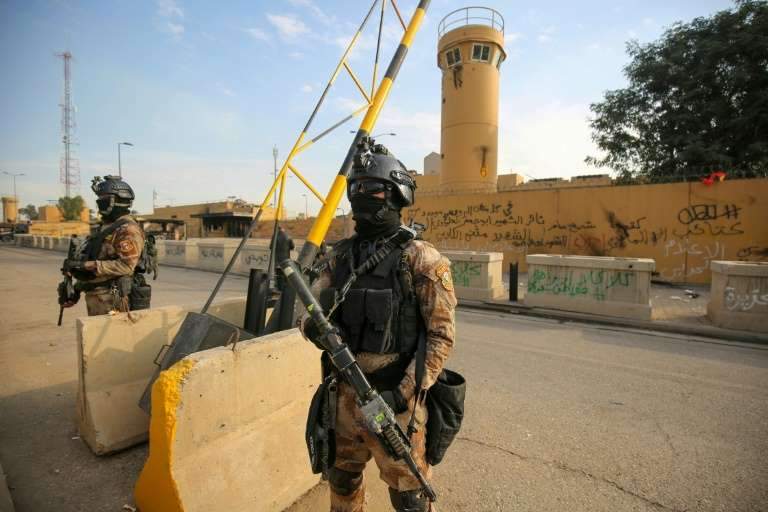Iran-US tensions decrease in Iraq, for now

It has been weeks since Iran-backed factions in Iraq traded fire with US forces, but experts warn the rivals could be using the time to prepare for an escalation.
After the last Katyusha rockets slammed into American installations in Iraq in March, the United States began planning an unprecedented bombing campaign in Iraq and new Iran-aligned factions threatened to kill Western ambassadors.
"Even if we haven't seen rocket attacks, the Iranians are repositioning themselves for something else," said Phillip Smyth, who researches Shiite armed factions for the Washington Institute for Near East Policy.
"Meanwhile, US troops in Iraq are hunkered down and taking the threat more seriously," Smyth said.
Those troops, deployed as part of the coalition fighting the Islamic State group, have been hit by more than two dozen rocket attacks that have grown gradually deadlier.
Last month, the Pentagon began drafting plans for a major escalation against the Iran-backed factions -- namely the hardline Kataeb Hezbollah -- blamed for the rockets.
"Washington told us they'd simultaneously hit 122 targets in Iraq if more Americans died," a top Iraqi official said.
The scale of such bombing could have enormous consequences.
Coalition head General Pat White feared it could spin out of control, writing to US Central Command in March with "concerns" that targeted groups would respond, putting thousands of coalition troops in "significant" danger, according to a US military official who saw White's memo.
Non-US coalition members are "nervous" the bombing could kill civilians or push Baghdad to permanently oust foreign troops, diplomats from two coalition countries said.
The plan has been set aside for now as the US fights the spread of COVID-19, three Western diplomats said.
"But if there's another attack and it kills an American, then all of this comes back again," one told AFP.
- Coalition 'no longer exists' -
Washington and Tehran have already edged dangerously close to outright conflict after the US killed Iranian general Qasem Soleimani in Baghdad in January, prompting Iran to launch ballistic missiles at US troops in western Iraq.
Apparently fearing more strikes, the US deployed Patriot anti-missile batteries and C-RAM rocket defence systems to Iraq to protect its forces, a move which US officials acknowledged to AFP could be seen by Iran as provocative.
At the same time, it reduced the coalition's presence, pulling out of half the bases it once operated from in Iraq and withdrawing hundreds of trainers indefinitely as a precautionary measure against COVID-19.
As most non-US troops were trainers, that has left relatively more Americans in the remaining forces.
"The coalition as we knew it no longer exists," a Western diplomat from a coalition country told AFP.
A key lawmaker from Fatah, the bloc representing pro-Iran factions, cast doubt on Washington's intentions this week.
"The American side wasn't serious about withdrawing and handing over bases, and was actually re-deploying its troops for tactical reasons to protect its soldiers amid the spread of the coronavirus," said Mohammad Ghabban.
Kataeb Hezbollah has insisted the shifts should lead into a full and permanent withdrawal, raising the prospect of further rocket attacks.
"There will be no death for these forces if they keep withdrawing as part of a total departure from Iraq," the group said this month.
- 'Turn up the flame' -
At the same time, apparently new factions have emerged.
In the last month, three previously unknown groups have called for rocket attacks, threatened the American and British ambassadors, and released rare drone footage of the US embassy in Baghdad and the western Ain al-Asad base, which hosts the most coalition troops.
Two top coalition officials said they suspect the groups were "the same old actors" -- Kataeb Hezbollah and allies -- who were "organising themselves slightly differently".
Smyth said it appeared Iran was restructuring its Iraqi allies and using front groups for plausible deniability.
"There's calm now, but they'll just turn up the flame once the situation improves for them," Smyth added.
In politics, too, the tug-of-war between Iran and the US over Iraq is at a critical juncture.
Premier-designate Mustafa Kadhimi, seen as a compromise figure, is preparing his cabinet and US officials are due to visit Baghdad in June for key talks.
"This was a rollercoaster relationship -- it shouldn't be," said an Iraqi official with knowledge of the talks.
But if Kadhimi fails, a Western diplomat told AFP, the US may cast Iraq's government as irreversibly "hostile and pro-Iran" and introduce new sanctions.
Even the June talks could lead to more polarisation, said Renad Mansour, a researcher at Chatham House.
"The US want to push the Iraqi government to choose a side, which could be a risky move," he told AFP.
"It's almost making the Iraqi government decide: are you with us or against us?"
Photo: AHMAD AL-RUBAYE Iraqi counter-terrorism forces stand guard outside the US embassy in the capital Baghdad
Link: https://www.msn.com/en-us/news/world/iran-us-tensions-decrease-in-iraq-for-now/ar-BB12SwBu











